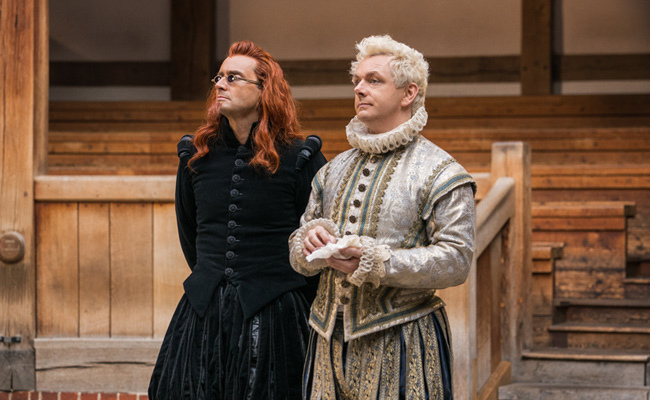“I always have an issue with people who say ‘it’s much more fun to play [someone] bad’,” Michael Sheen tells the Sydney Morning Herald at smh.com.au. “Is it? I think we’ve failed as a species if good is boring. If we made good boring then we are doing something wrong. Goodness is about sharing, joy and being generous and connecting, and that’s the best thing we have in the world. That’s what makes life living. So if you can’t make that interesting or fun, you might as well pack up and go home.”
Interviewed as part of an article about the Amazon-BBC adaptation of Terry Pratchett and Neil Gaiman’s apocalyptic comedy Good Omens, he explains that in working out how to play the angel Aziraphale he decided that it would be the angel’s nature to love other characters, including David Tennant’s demon Crowley.
“There’s a lazy way of playing goodness and I didn’t want to do that. I’m always trying to look for moments that will allow an audience to feel for what he’s doing in a way that is authentic, that connects.”
Book
At syfy.com Neil Gaiman maps out why he made changes he did when adapting the book, while at collider.com David Tennant explains why Crowley, as played by him, looks rather different to how he is described in the original book.
“You know we started with a much more sort of clean cut look because that’s…if there is any description of Crowley, it’s that, it’s that he wore a sort of three-piece suit and his hair is slicked back,” he says. “But that’s very much a Crowley born of the late 80s, 90s, I think, which is when the book came out. And he should be of now. So, we kind of had to slightly expand with that. If you are doing that kind of yuppie, American Psycho thing then, what’s the 2019 equivalent? I think he feels like he’s really cool. So, what does somebody who thinks they’re really cool in 2018 look like?”
Another fascinating detail in that article is that it features both lead actors commenting on how, in a depressing way, the adaptation feels rather more timely than the original book did.
“Well, because it was written 30 years ago,” Michael Sheen says, “Neil and Terry had to introduce a line into the book, which was to say it was something along the lines of it was ironic it was the end of the time when everyone was getting along so well. Which they were, then.
“The Berlin Wall had come down, the world was a very different sort of place at that point,” he continues, “and, so, Neil talked about the idea that they felt kind of odd to be writing about the apocalypse when we were at the end of history as people were calling it at the time. The Cold War had come to an end and it seemed like we discovered the answer to everything. Now, 30 years on with the TV adaptation, we’re in a different position. So, it feels more prescient now.”
“Knee-deep in history suddenly,” David Tennant interjects, and Sheen agrees: “Too much history.”
US comedian’s ring of truth
Meanwhile, over at patheos.com/blogs/deaconsbench, Deacon Greg Kandra highlights a fascinating New York Times interview with comedian and presenter Stephen Colbert, who talks of being raised Catholic and what he has learned about loss from multiple readings of the last century’s great Catholic epic The Lord of the Rings, and how he understands Faith.
“Faith is not trying to change the world,” he says. “Faith is not trying to change God. Faith isn’t trying to change the order of things. Faith isn’t trying to maintain your position. Faith isn’t trying to make less of the other. Faith is asking God to change you. You are the subject of God’s love, and in accepting that, you can transform yourself and release yourself of these appetites that are almost always at someone else’s expense.”


 Greg Daly
Greg Daly David Tennant and Michael Sheen in Good Omens. Photo Credit: Amazon Prime.
David Tennant and Michael Sheen in Good Omens. Photo Credit: Amazon Prime. 